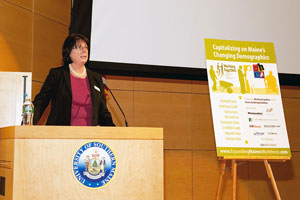Katherine McCary
Managing Partner, C5 Consulting, LLC.
Including disability into the corporate workplace is a high priority for many of our Members. At the DirectEmployers 2012 Annual Meeting & Conference, I had the pleasure of sitting down with Katherine McCary, Managing Partner of C5 Consulting, LLC, a women owned, certified disabled-owned and operated business. During our conversation, Katherine dispelled common myths and provided suggestions on how companies can improve recruitment efforts and outreach to people with disabilities.
Tell me a little bit about C5.
Most people are unfamiliar with C5 because it’s only been in business for a short time. However, people are familiar with my partner, Martha Artiles, and me, because together, we’ve just spent the past 20 some years working on disability as a diversity business strategy. So C5’s name is just beginning to get out there. With our vast corporate background, we can partner with employers to help them strategize how to include disability into their corporate culture. Corporate culture change is key to assure talent with disabilities will remain with your organization long after they have been hired. And that’s really what we are passionate about.
What fuels your passion around disability awareness and educating employers?
To me disability is no different than any other diversity strategy, and for talent you have to look for a variety of diverse dimensions to bring the best and the brightest into the workforce. My background is in recruiting. That’s what I did for 20 some years before I went into disability. It was all about what can the person bring to the table – can they do the work and are they going to add to the bottom line.
What are some of the myths that you’ve encountered about hiring with disabilities?

Katherine speaking at the University of Southern Maine (photo from C5's website).
For an employer who is given the weight of the whole federal mandate, what is your best advice on how to get involved in recruiting people with disabilities and doing it well?
Across the country there are many, many companies that have been within this space for quite some time. None of them are perfect. We’re all on this journey. I would almost step back and say, please don’t plan to recruit 20 people with disabilities tomorrow because of federal requirements. Just like any other diversity population, if you just say, “Well, we’ve got to hire them, then let’s go hire them and let’s go do it”, what’s the value to the person, what’s the value to the corporation?
I would suggest that this is strategic thinking from the top down, leveraging employee resource groups, creating an employee resource group that may have a relevance to disability, and use that talent that you already have to start building partnerships with the community. Understanding organizations like the Business Leadership Network, which is all about employers sharing best practices, peer to peer. Then, as you begin to change that culture, you start reaching out and bringing in talent. You can also grow talent. Look at internship opportunities and mentoring opportunities. There are many organizations that focus on internships specifically for college and high school students with disabilities.
What would your final advice be to employers?
The advice to employers would be don’t be afraid of this. This is a natural condition of life and there’s a talent pool that you’re missing. It should not be a compliance issue. There have been many strides, but we have a long way to go. What I would tell employers is to get out there, get engaged and test the waters. If you fail, you fail, but don’t give up. Get your employees engaged in this because it’s not just the senior executive saying go and do. It’s also all the recruiters and Human Resource professionals, hiring managers, and the workforce. To sum it up, don’t be afraid, get out there, you’re missing a huge pool of talent and if you don’t do it, your competitor is either doing it now or will be doing it before you, and you will not be in business.
Thank you, Katherine, for sharing your expertise and guidance. We always appreciate and encourage our members and partners to share their advice and best practices with the membership. Want to learn more about our disability partners? Check out the DirectEmployers disability partners page or contact your Member Services representative for more information. Members can view Katherine’s presentation “Beyond Compliance to Employer of Choice” in Pipeline.

